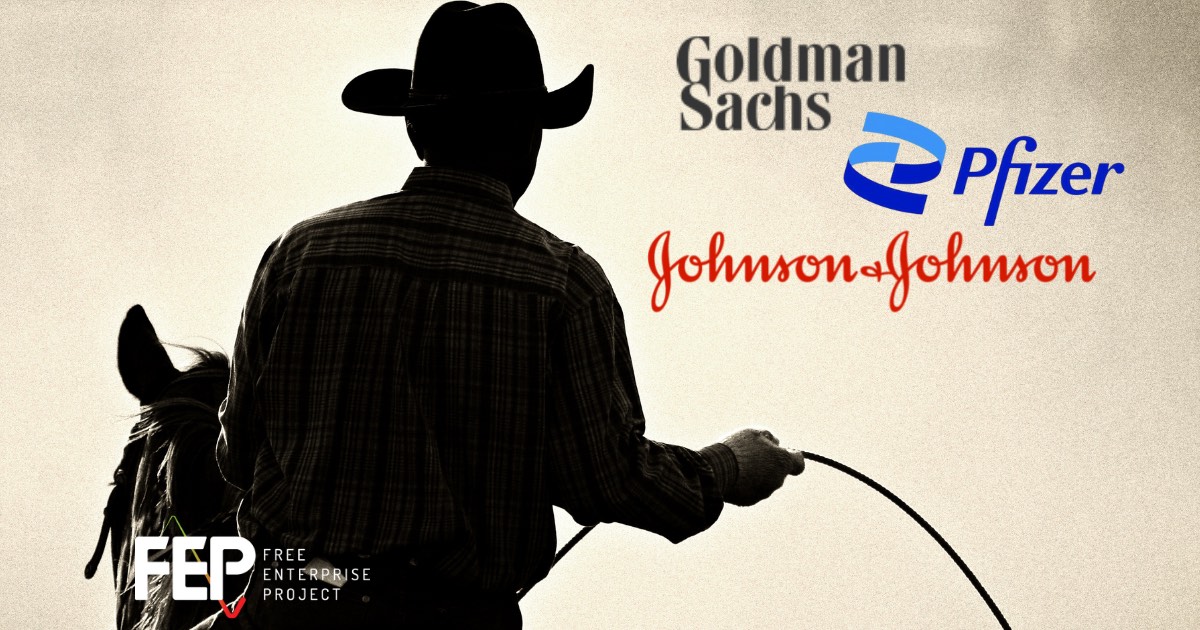
28 Apr 2022 Goldman Sachs, Pfizer and Johnson & Johnson Held Accountable by Shareholder Activists
Shareholder Proposals Question Spending and Racial Equity Policies
Washington, D.C. – The Free Enterprise Project (FEP) presented proposals at the Goldman Sachs, Pfizer and Johnson & Johnson annual shareholder meetings today. The Goldman Sachs and Pfizer proposals addressed the companies’ charitable and political contributions, respectively, while the Johnson & Johnson proposal challenged diversity policies that give preference to members of certain racial, ethnic and sexual identity groups.
At today’s Goldman Sachs meeting, held in New York City, FEP Director Scott Shepard presented Item 4, which called on Goldman Sachs to increase reporting on its charitable contributions.
“Goldman Sachs thinks it’s OK to distribute shareholder money according to the personal policy preferences of executives instead of on an objective basis, and may do so without any restrictions or monitoring,” said Shepard after the meeting. “There’s that infamous Goldman arrogance again.”
Shepard also called out Goldman Sachs CEO David Solomon for exploiting shareholders:
As it happens, Goldman is using shareholder assets to fund corrupt organizations or to pay for David Solomon’s fancy lunches and trips to Davos, Switzerland to hobnob with his World Economic Forum pals. That’s not how fiduciary duty works, and he and his board should be ashamed — not arrogantly proud — of that behavior.
Shepard’s remarks, as prepared for delivery, can be read here. The audio of his presentation can be heard here. Item 4, and Goldman Sachs’ response to it, can be found on pages 75-76 of the company’s proxy statement. The proposal was not approved.
FEP’s proposal at the Pfizer annual meeting also addressed corporate spending, specifically regarding funds used for political lobbying. At the virtual meeting, FEP Associate Ethan Peck presented Item 5, which requested that the company publish an annual report on the congruency of its political expenditures against the company’s fundamental purpose and fiduciary responsibility to its shareholders.
After the meeting, Peck commented:
The Pfizer board isn’t incompetent; it’s malicious. It knows that the company’s political contributions deepen corporate ties with the administrative state in a way that squashes the individual, and that’s exactly why it does what it can to conceal such spending from shareholders. It knows that sponsoring organizations such as the Human Rights Campaign and the World Economic Forum is controversial – for obvious reasons – and that’s exactly why the company champions its mysteriously perfect Corporate Equality Index score and Mr. Bourla’s “invitation” to Davos while all too conveniently failing to disclose Pfizer’s paid partnerships with such organizations.
Peck also called out Pfizer CEO Albert Bourla directly:
Bourla is a globalist leech. He collects a $21 million salary from a company that’s killing everyday Americans with addictive drugs at a faster rate than any South American cartel. In a nation that welcomed him, he uses his position to stomp on our civil liberties and spin the revolving door faster. And he is using shareholder money to finance his free trips to Davos where he advances the transhumanist agenda.
In addition, Peck attempted to ask Bourla a question about Pfizer’s involvement with the World Economic Forum’s transhumanism agenda. However, Pfizer did not provide investors with the ability to ask live questions until the official Q&A session was over, with Pfizer investor relations telling Bourla that no live questions had been received. The online window to submit questions was then opened, unannounced, for less than 30 seconds during Bourla’s closing remarks, but despite Peck submitting his question twice during that window, his question was ignored.
“It’s uncommon for there to be no questions at all at a shareholder meeting, especially at the meeting of a massive corporation like Pfizer,” Peck noted afterwards. “Perhaps it was an honest mistake on their part, but it wouldn’t surprise me if it was an intentional ‘mistake’ instead. Either way – incompetence or malice – Pfizer has yet again failed to fulfill its responsibility to its shareholders.”
Peck’s full statement in support of Item 5, as prepared for delivery, can be read here. The audio of his presentation can be heard here. Item 5, and Pfizer’s response to it, can be found on pages 79-80 of the company’s proxy statement. The proposal was not approved.
At the shareholder meeting of another pharmaceutical giant, Johnson & Johnson, FEP Program Coordinator Sarah Rehberg presented Item 6, which requested that the Board of Directors commission a racial equity audit analyzing the company’s impacts on civil rights, equity, diversity and inclusion, and the impacts of those issues on the company’s business.
“Our proposal seeks to ensure that all employees – not just those deemed diverse by the company – feel included and receive equal treatment when it comes to workplace dynamics and career advancement,” Rehberg said at the meeting, which was held virtually.
Rehberg questioned how the company’s Diversity, Equity and Inclusion (DEI) policies comport with its nondiscrimination policies
[P]rogress on DEI goals is a consideration when it comes to the company’s compensation and benefits program. It is difficult to therefore reconcile the company’s DEI policy with its nondiscrimination policy, when it attaches financial incentives to necessarily suppressing the advancement of those the company deems “non-diverse.”
Rehberg’s remarks, as prepared for delivery, can be read here. The audio of her presentation can be heard here. Item 6, and Johnson & Johnson’s response to it, can be found on pages 126-130 of the company’s proxy statement. The proposal was not approved.
Investors wishing to oppose left-wing corporate donations, race-based discrimination and other “woke” policies infiltrating Corporate America should download FEP’s 2022 editions of the “Investor Value Voter Guide” and the “Balancing the Boardroom” guide. Other action items for investors and non-investors alike can be found on FEP’s website.
Today’s meetings mark the 14th, 15th and 16th times FEP has participated in shareholder meetings so far in 2022. To schedule an interview with a member of the Free Enterprise Project on this or other issues, contact Judy Kent at (703) 477-7476.
Launched in 2007, the National Center’s Free Enterprise Project focuses on shareholder activism and the confluence of big government and big business. Over the past four years alone, FEP representatives have participated in over 100 shareholder meetings – advancing free-market ideals about health care, energy, taxes, subsidies, regulations, religious freedom, food policies, media bias, gun rights, workers’ rights and other important public policy issues. As the leading voice for conservative-minded investors, it annually files more than 90 percent of all right-of-center shareholder resolutions. Dozens of liberal organizations, however, annually file more than 95 percent of all policy-oriented shareholder resolutions and continue to exert undue influence over corporate America.
FEP activity has been covered by media outlets including the New York Times, Washington Post, USA Today, Variety, the Associated Press, Bloomberg, Drudge Report, Business Insider, National Public Radio and SiriusXM. FEP’s work is prominently featured in Stephen Soukup’s new book The Dictatorship of Woke Capital: How Political Correctness Captured Big Business (Encounter Books) and Kimberley Strassel’s 2016 book The Intimidation Game: How the Left is Silencing Free Speech (Hachette Book Group).
The National Center for Public Policy Research, founded in 1982, is a non-partisan, free-market, independent conservative think-tank. Ninety-four percent of its support comes from individuals, less than four percent from foundations and less than two percent from corporations. It receives over 350,000 individual contributions a year from over 60,000 active recent contributors.
Sign up for email updates here. Follow us on Twitter at @FreeEntProject and @NationalCenter for general announcements. To be alerted to upcoming media appearances by National Center staff, follow our media appearances Twitter account at @NCPPRMedia.






